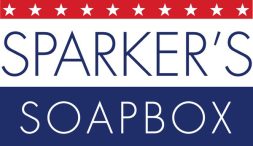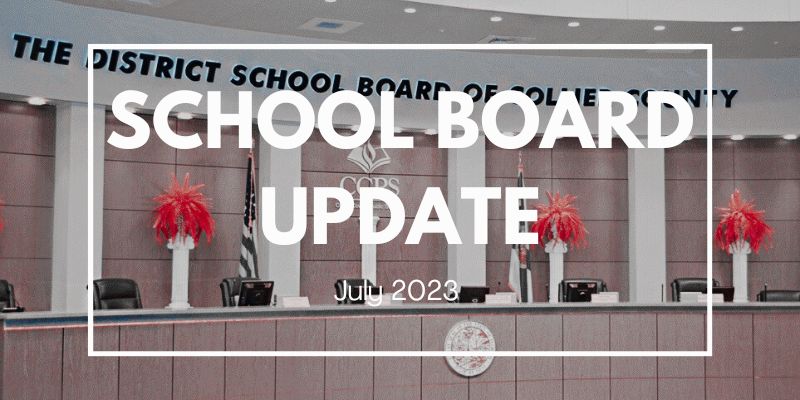
In this post, I summarize what I think voters should know about what happened at the Collier County School Board’s regular meeting and Tentative Budget Hearing, both held on Jul. 31, 2023. If you missed my last School Board update dated Jun. 22, read it here.
In this post:
- Ricciardelli Shares Her Vision
- CCPS Opens New High School
- CCPS Students’ State Test Results
- Objections to Books in CCPS Media Centers
- District Budget and Our 2023/24 School Taxes
- Upcoming Meetings

Ricciardelli Shares Her Vision
Dr. Leslie Ricciardelli was sworn in as superintendent of the Collier County Public School District on Jul. 31. After a months-long search, Ricciardelli earned the position in a split 3 to 2 vote in May. If you’re new to Sparker’s Soapbox and don’t know why we have a new superintendent and how Ricciardelli was chosen, see my prior posts here. I think it’s important for voters to know.

In a “motivational event for school leaders and administrative staff,” Ricciardelli shared her vision for the 2023-24 school year on Jul. 25. Speaking with NBC-2, she specifically mentioned that she is excited about introducing a “very structured and specific phonics program” for grades K-2 and new curriculum for middle and high school for students “who might need some additional support in reading.”
CCPS Opens New High School

Collier County’s 10th high school — Aubrey Rogers High School — opened debt-free as scheduled, welcoming 1,200 students at the beginning of the school year on Aug. 10. The school was constructed on land purchased by the District with great foresight in 2001, and was constructed without borrowing — a point of pride for the School Board. It was the District’s first new high school in 19 years.
According to Principal Ellen Keegan, innovation will be Aubrey Rogers’ defining characteristic, with facilities that can benefit any student’s interests. There is a performing arts center that can seat 1,300 people, a 4,000-seat sports stadium, and 98-inch interactive televisions in classrooms. Continue reading at Gulfshore Business.
CCPS Students’ State Test Results
In late June, the Florida Department of Education released the 2023 spring assessment results for schools across the state.

They also released scores for the new Florida Assessment of Student Thinking, or FAST, test — created in March 2022. The FAST assessments, which replaced the grade-level Florida Standards Assessments (FSA) for the first time this school year, showed progress students made throughout the school year as they mastered skills in reading and math. For more, see Gov. DeSantis Press Release announcing the new “groundbreaking” tests here.
According to the FAST assessments, an average of just 37% of Collier students in grades 3-10 were reading at grade level or above at the beginning of the 2022/23 school year. By mid-year, the figure rose to 43%. And by the end of the year, 54% of students were reading at grade level or above. That figure is roughly four percentage points better than the state average of 50%. For detailed results by district and by grade, click here.
While CCPS students showed a considerable improvement over the year, 48% were not reading at grade level at the end of grade 10. This is one reason the District has adopted the new phonics program mentioned above.
Collier students did much better in math than in reading: 69% of students in grades 3-8 performed at or above grade level for mathematics at the end of the year, up from 21% at the beginning. Statewide, students began the year with just 14% of students at or above grade level and ended with 56%.
“CCPS continues to outperform the state, serve as a model for progress monitoring, and rank at the top of all Districts statewide,” said Superintendent Ricciardelli in a news release. “This is particularly noteworthy in light of the fact that we implemented new standards for instruction and instructional materials in grades K-12 math and 6-12 [English Language Arts], as well as a new assessment system,” she said.
Objections to Books in CCPS Media Centers
As required by Florida law, CCPS has a process by which parents and community members who are residents of Collier County can object to a particular book in a Collier County Media Center by submitting a Book Objection Form. Any objection is then reviewed by a Book Objection Committee comprised of nine members, including two CCPS parents and two community members. The Committee’s conclusions are then considered by the District’s Executive Leadership Team and then forwarded with their recommendation to the School Board for a vote.
The District’s Policy 2520 Media Center Books and Reading Lists describes the process.
Recently, objections were submitted concerning two books: Took: A Ghost Story, by Mary Downing Hall, and The Witches: A Graphic Novel, by Roald Dahl.
The District convened the Book Objection Review Committee to consider the books. The Committee recommended that both books remain in all school media centers and not require parent permission for check-out.
At their meeting on Jul. 31, all Board members said they read both books and offered their comments before voting on the recommendations. (Watch the Board discussion here, beginning at 3:19)
Took: A Ghost Story
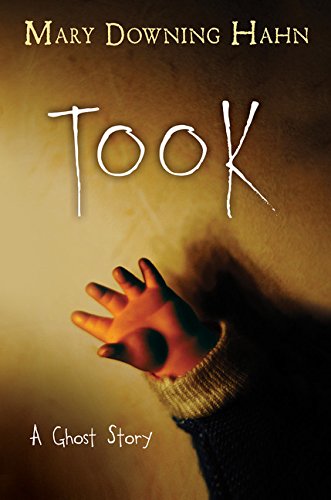
“This spooky mystery from one of the genre’s longtime virtuosos features seventh-grader Daniel and his seven-year-old sister, Erica, who face severe culture shock when their father’s job loss forces them to move from suburban Connecticut to an abandoned farmhouse in rural West Virginia.” Publishers Weekly.
Rutherford said he opposed the book because it “has witchcraft and other things in it. I don’t think it’s good for anyone.”
Lucarelli thought the book might be “too scary for really young kids,” but given its length, the youngest students were not likely to read it.
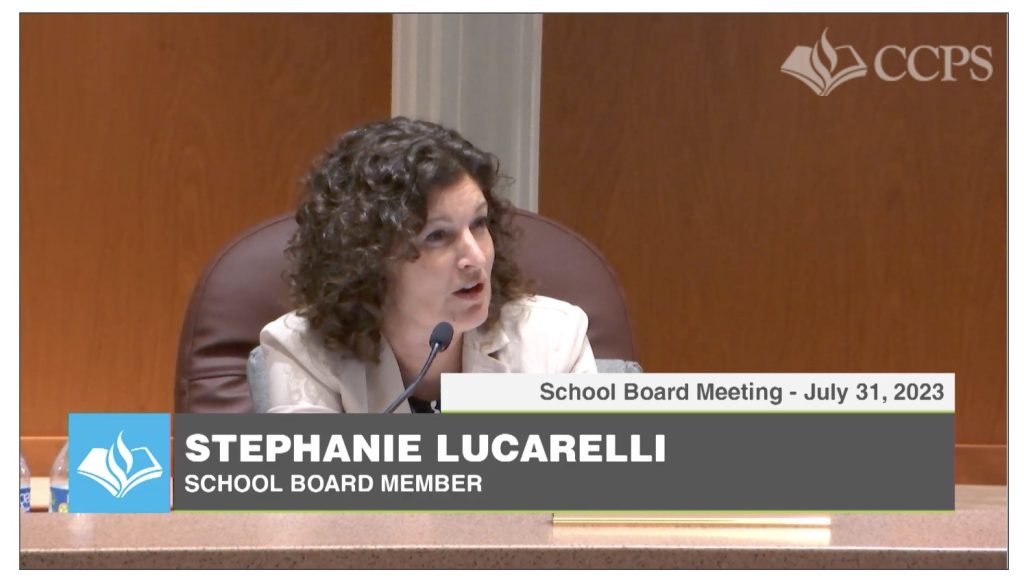
Lichter said she would prefer parental approval at the elementary level.
Carter and Moshier said they liked the book.
After discussion, the Board voted 3 to 2 to accept the Committee’s recommendation to keep the books in the media centers and not require parental consent. Lichter and Rutherford were opposed.
The Witches: The Graphic Novel
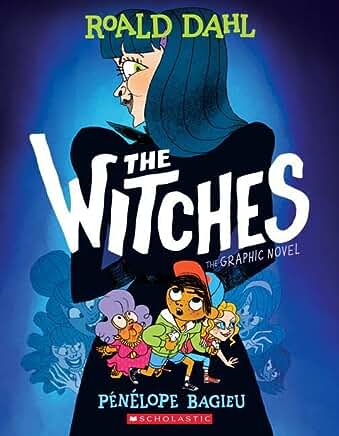
“Like Dahl’s other works, which include Charlie and the Chocolate Factory and Matilda, The Witches is darkly humorous,” according to Publishers Weekly. “It follows the adventures of a recently orphaned boy as he learns of the evil witches that prey on children and then encounters them in real life.”
Rutherford was the first to offer comments. “Witches are real,” he said. “They’re active in today’s world… Why do you think the police department checks up on cats that get killed and other animals like that? They are active, and if you talk to a real one, in today’s world, they’ll tell you what they’re doing.

“If you don’t recognize spiritual activity that’s happening in today’s world,” Rutherford continued, “I think you’re just not reading all the proper information.”
Carter said the book doesn’t seem to meet the standards that would allow this book to be banned. “We have to be careful what we start banning or what we start putting on parental consent,” he said.
Lucarelli said she had no “major objections” to the book but is “not a fan of graphic novels.”
“I think it’s very good,” said Moshier. “I’m not a big fan of graphic novels, but it made the reader think about good versus evil, and I kind of liked that.”
Lichter objected that the grandmother in the book is smoking a cigar, “which doesn’t seem necessary.” She also objected to “a kissing scene where the guy literally has his tongue out while the girl is trying to kiss him.”
In the case of this book, a Board majority did not accept the Committee’s recommendation. The vote was 4 to 1 on a motion to keep the book in school media collections, but it required parental approval at the elementary level. Rutherford was opposed.
As of Aug. 4, 23 books in CCPS Media Centers have been designated as books containing mature content and require parent permission to be checked out. See the list here.
By comparison, 357 books have been banned in one or more schools across Florida, according to PEN America’s Index of School Book Bans.
District Budget and Our 2023/24 School Taxes
On Jul. 31, the School Board held a state-mandated Tentative Budget Hearing and set a maximum 2023/24 school tax rate and proposed budget. This is one of the final steps in the District’s annual budget planning process.
Millage rates and taxable property values are the two key factors in determining tax revenues for the District. One mill equates to $1 of tax for every $1,000 of value.
These charts from the District’s 2023/24 Tentative Budget Book show historical data about the County’s taxable property value (tax roll history) and the District’s millage history, as well as the employer contribution rate the District pays into the Florida Retirement System (FRS), the District’s health insurance cost per employee and the number of District students:

Proposed Maximum Millage Rate
As seen in the chart on the left, Discretionary Local Millage has remained relatively constant, and the State Required Millage has steadily declined, while taxable property value, District costs, and the number of students have increased.
At the Hearing, board members considered a staff-proposed maximum countywide school millage rate for the 2023/24 budget of 4.2920 mils. This rate is 0.167 mils lower than the prior year.
The tax rate that, given the 16.7% higher taxable property value, would result in the same dollar amount of taxes as last year (i.e., the “rolled back rate”) is 3.884 mils. The approved rate of 4.2920 mils is 10.66% higher than the rolled-back rate. Therefore, the District is considered to have a tax increase.
That said, according to a presentation by CCPS Chief Financial Officer John Antonacci, homeowners whose taxable property value was limited to 3% by the state’s Homestead Exemption would have a slight tax decrease with the proposed millage rate. (Presentation, page 12)
Proposed Tentative Budget
The proposed tentative budget for the 2023/24 school year totaled $1.556 billion, allocated as follows:
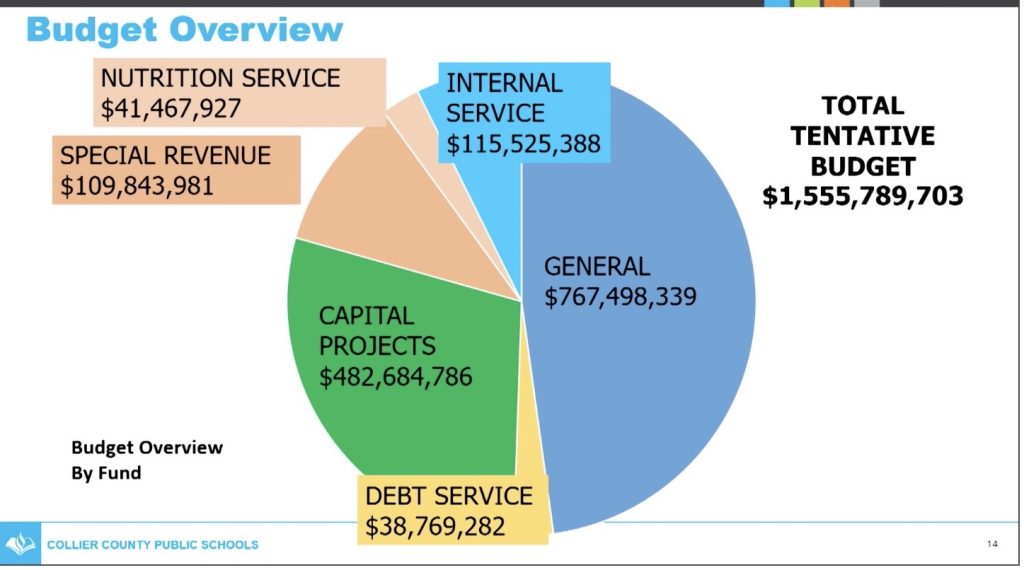
After reserves and “redundancies,” this budget would provide $19,772 per student. It would also leave the District with end-of-year reserves of $370 million, anticipating two new elementary schools in the coming years (one by 2025 and the other by 2026) and other known needs.
Transfers between funds, fund balances including fiscal reserves, and the existence of Internal Service Funds overstate expended amounts in total and on a per-student basis.
For more on these “redundancies,” see the 2023/24 Tentative Budget Book, page 12.
The tentative budget of $1.56 billion compares to the final budget for the prior year of $1.44 billion before reserves and redundancies. After reserves and redundancies, the comparable amounts are $1.00 billion and $0.93 billion. (For the 2022/23 Final Budget Book, click here.
There were two public speakers and a presentation of the proposed millage and tentative budget by CCPS Chief Financial Officer John Antonacci, followed by a lengthy Board discussion. The Hearing lasted 1 hour and 20 minutes, and the recording can be viewed here, from 0:35:10 to 1:55:09.
Public Comments of Note

Keith Flaugh of Florida Citizens Alliance addressed the Board during public comments. He reminded Lichter, Moshier, and Rutherford that, during the 2022 election cycle, they had signed a pledge not to raise taxes and to freeze the CCPS tax rate to the rollback rate. And “Erick Carter, I encourage you, as a self-proclaimed conservative, to get on board,” he concluded.
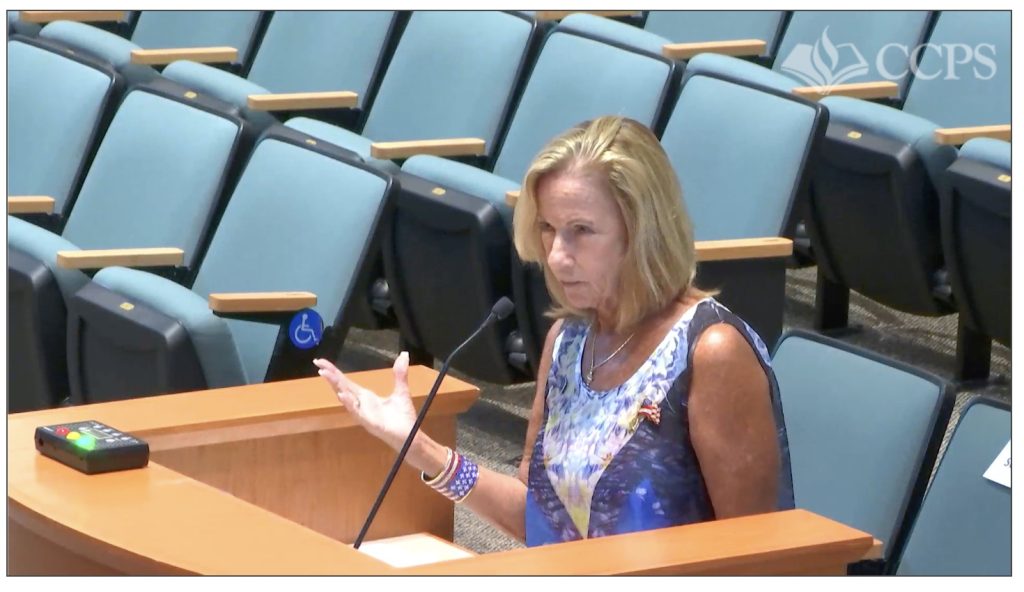
Diane Van Parys commented on the District’s spending on Nutrition Services, specifically funding for school meals. She noted that while 54.7% of CCPS students are economically needy, just 15.5% of students take advantage of the offered free breakfasts. She also noted that while 54.6% of students take lunch at school, all students can get free lunch. “We have a problem with how many kids are eating our food,” she said. The Nutrition Services budget has increased, but we have a “stagnant number” of students eating.”
Board and Staff Comments of Note
Rutherford was the first to speak. “Why would somebody vote for me even if I were to run again if I didn’t keep my promises?” he asked, seemingly addressing Flaugh’s comment.
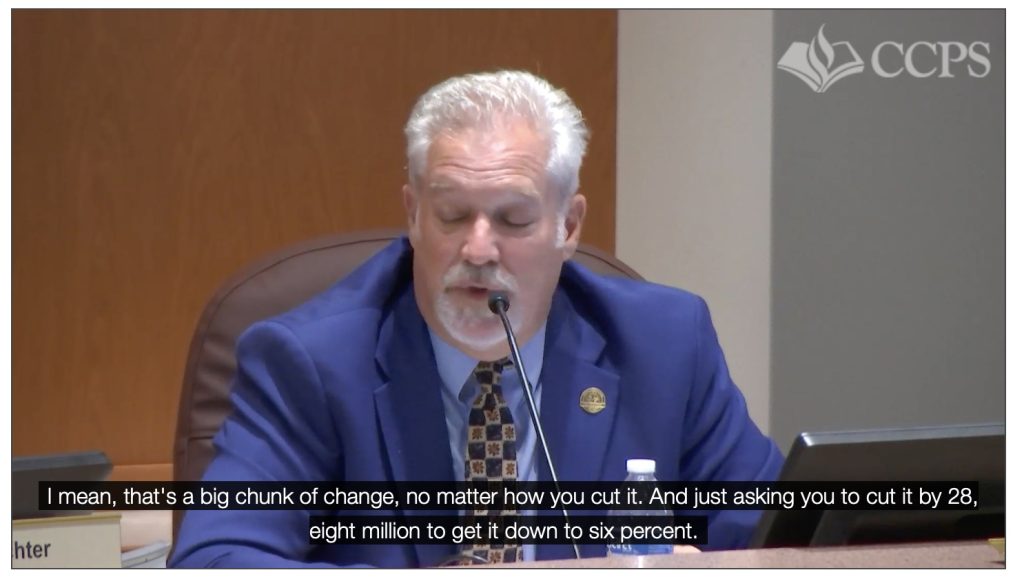
Moshier proposed a millage rate that was an increase of 5.9% over the prior year, almost half the proposed 10.66% increase. “Then we’re keeping the pledge,” he said, apart from allowing for inflation.
Lichter asked Ricciardelli to speak about some of the things that had already been done to “trim the fat” in the budget. When she concluded, Lichter said, “So there are [already] a lot of things that we have done since we’ve been here to get rid of a lot of waste of our money as taxpayers.”

Rutherford asked if any District programs could be eliminated but could not provide specific suggestions. Lichter said that the District had already eliminated the Cambridge Elementary and Connect for Success initiatives, which had been expensive. Ricciardelli also said she had previously provided return-on-investment (ROI) analyses on all programs and initiatives to Board members.
In response to Van Parys’s remark about the higher budget for Nutrition Services, CFO Antonacci pointed out the higher cost of food due to inflation. He also said budgeted Nutrition Services funds could only be spent on nutrition services because the funds come from a federal program, and the District can only maintain a three-month balance in the account.
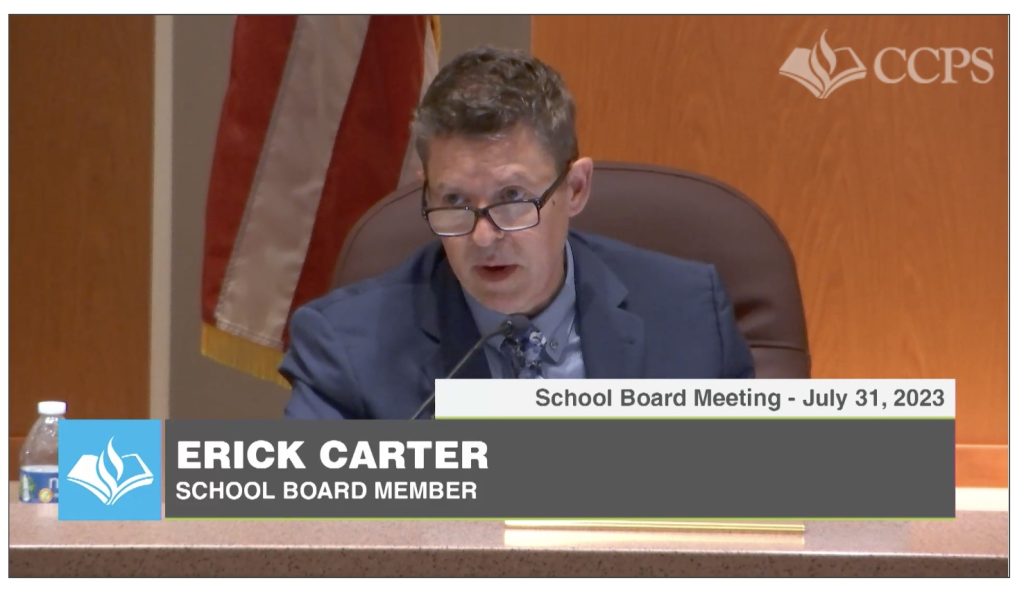
Carter spoke to Flaugh’s earlier remark about “commitments. “I know you gentlemen have made promises to men, but there’s also a promise to God that you have to uphold,” he said. “Proverbs 22:7 says, “The rich will rule over the poor, and the borrower is a slave to the lender.’ I’ve always tried to run this district to keep the taxpayers of Collier County out of slavery…. And sometimes that means collecting more today, so we’re not in debt tomorrow.”
Lichter also responded to Flaugh’s comment in an email newsletter on Aug. 7.

“When I pledged not to raise taxes, I was aware that 22 other Florida school districts (out of 67) added an additional tax through a referendum and 30 school districts in Florida added a half-cent sales tax to raise money for capital to address student growth,” she said. “I did not violate the pledge with my vote last week, and I would NEVER support those tax increases. Voting no would have been much easier, but those who voted no, proposed no real solution or plan…. Not only is the board committed to making improvements when it comes to the budget, but the new leadership team is also on board and committed to making necessary changes that ensure we receive a great return on investment,” she concluded.
After discussion, the proposed millage and budget were approved by a vote of 3 to 2. Moshier and Rutherford were opposed.
At public hearings on Sep. 21, the Board will vote to finalize the budget and millage rates. It may maintain the millage rates at or lower the rates below the levels approved on Jul. 31. But it may not raise the rates higher than what was approved without meeting extraordinary public notice and advertising requirements.
Upcoming Meetings
The Board held its regular August monthly meeting on Aug. 8. Watch the meeting recap and the recording here.
Aug. 28 — Workshop to discuss Board Priority #3 – Fiscal Responsibility: Maximize Return on Investment and Examine Cost-Saving Opportunities
Sep. 11 — Final Budget Hearing
For the schedule of the meetings for the rest of the calendar year, click here.
